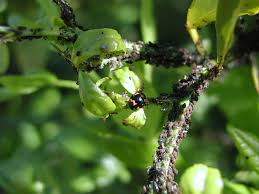Florence Anyona, a kale farmer in Kisii cannot sell her crop due to infestation by aphids and leaf miners which have reduced the quality of her produce.
She has sold nothing since the produce was infested two months ago.
“Initially, I use to sell between one to two bags at Kisii market weekly at Sh1200 per bag but currently three quarters of the farm has been affected leaving me short of supply,” said Anyona.
Anyona, a technical officer at the Ministry of Agriculture started kale farming in July 2018 after buying a quarter acre piece of land in her rural home from her savings.
She bought kale cuttings at Kisii market at two shillings per cutting before planting them in the farm after applying cow and chicken manure at the rate of one handful per hole.
We delve onto how to solve the problem to help farmers like Anyona and many others who are into kale farming.
Aphids and leaf miners are pests that may cause 100 per cent yield losses in kales.
Aphids are pests that drill into the leaves of crops. They suck the sap with the nutrients, causing severe produce losses due to unhealthy crops while leaf miners are small insects which feed between the surfaces of the leaves.
The leaves curl because of the heavy infestation from the underside. This condition reduces the surface area for photosynthesis, the food making process in plants.
Related content
Onions stop tomato aphids attack
Plantwise plant clinics helps Kenyan farmers grow more and lose less to crop pests and diseases
Government urged to remove the newly introduced 16 per cent VAT on pesticides

Aphids atack on kales. Courtesy
Because of the extraction of the nutrient-rich sap, some leaves turn yellow due to malnourishment, which also reduces photosynthesis resulting from the absence of the green pigment. This in turn affects the overall production of the crop.
Presence of aphids on kales can be checked by looking at the lower leaves where you will see black sooty mould.
Since aphids feed on the underside of leaves, chemical control is not effective. Research by the Kenya Agricultural and Livestock Research Organization reveals that the pest can be controlled by intercropping kales with onions, coriander and garlic or spider plant.
Onion’s smell for instance repels aphids while crop rotation with non-victim crops like coriander breaks the life cycle of the pest.
Farmers can spot leaf miners by presence of moths and larva on the leaves.
Leaf miners can be controlled by rotating kales with non-host crops such as maize, beans and cabbages.
To control it, remove and burn all crop residues or bury infested leaves and fruits 60cm deep.
They can also be controlled directly by spraying with spinetoram chemical at the rate of 18 to 30ml per 20 liters of water. A 250ml package costs Sh250 in agrovets.
According to the Agrochemical Association of Kenya, pests lead to losses of between 40 to 100 per cent in crops in Kenya annually.
















Comments powered by CComment